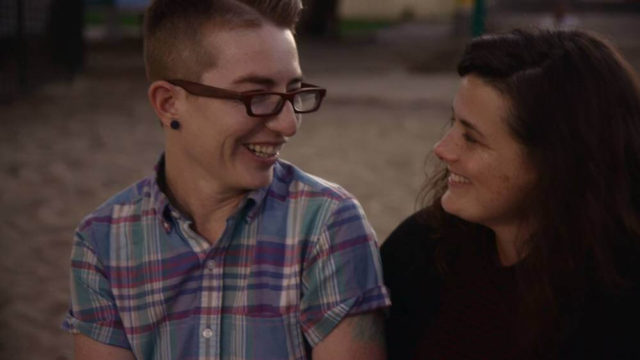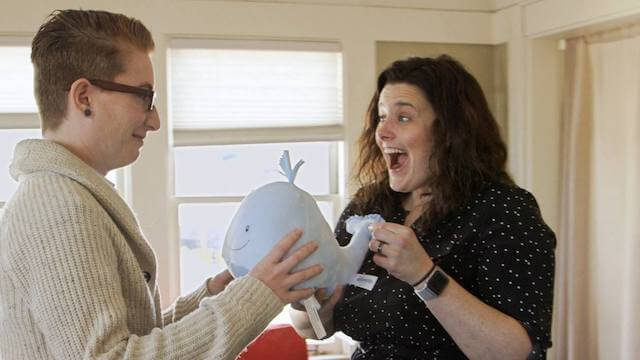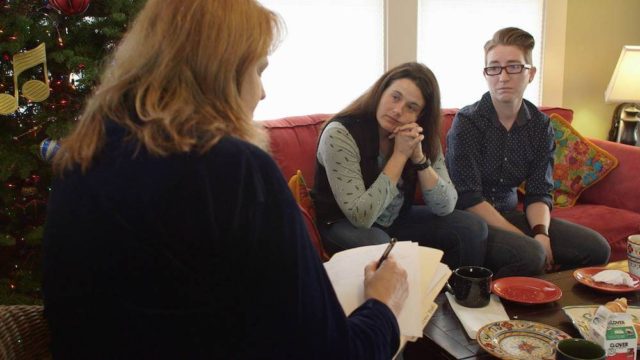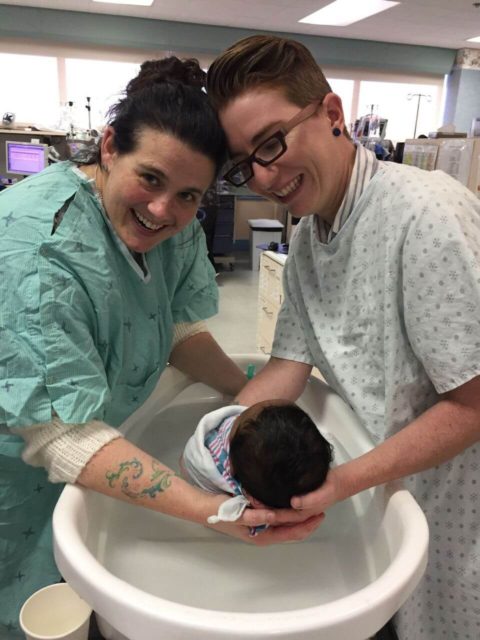By Katie Moritz | Rewire
There are almost half a million children in the U.S. foster care system, and almost a quarter of them are waiting for adoption into a safe home. That’s why, when Nicole Opper and Kristan Cassady, a queer couple living in Oakland, California, decided to heed their urge to parent, they opted to adopt from foster care.

But that’s not all. They also decided to film their experience and put it on the internet for all to see—to shed light on an often misunderstood topic and bring attention to foster-to-adopt as a path to becoming a parent.
“The F Word” is a new Indie Lens Storycast docuseries that follows Opper and Cassady through the ups and downs of becoming foster parents—from filling out the extensive paperwork, to sitting through a nerve-wracking first meeting with a social worker and answering tons of personal questions, to the complex issue of transracial adoption, to the heartbreak of finding out placements they were hoping for weren’t meant to be. And they’re already crowdfunding for a second season to share even more of their story.
“People have just been so encouraging and sweet and kind and all of these parents, some adoptive parents, some not, have reached out and gotten in touch,” Opper said of releasing the very personal series. Opper is a documentarian whose first film, “Off and Running,” also focused on the issue of adoption. “We get tons of messages every day from people, (that) this could be their story.”
The bite-size, heartwarming (and sometimes heart-wrenching) episodes are easy to take in—Opper and Cassady are both funny people and total #relationshipgoals. But the episodes also pack a punch. The series shows the realities of becoming a foster parent—the system is built to do what is best for the child, which means the dreams of hopeful parents sometimes don’t pan out.
I got the chance to chat with Opper about the foster system myths she hopes the series will bust. And a bit about new parenthood. Spoiler alert: The couple adopted a ridiculously cute baby very recently.
“He’s a fun kid, full of laughter and smiles,” she said. “He wakes up smiling and checking out everything that’s going on around him.”
Every child has their own story
The most pervasive myth about foster parenting? That every child in the system is “damaged” and “can’t heal,” Opper said.
“This is a tricky conversation because the reality is most kids who spend time in the system do have trauma backgrounds,” she said.
“But to say that can’t be overcome” is “wrong and problematic” and diminishes the resiliency and the individuality of these children.
“Most of what we get in the mainstream media are the horror stories,” she said. “You have to seek out some of the positive stories that exist…, youths that are growing up to be healthy.”
Telling the truth about foster parenting
Horror stories about children adopted from foster care circulate in “a misguided attempt to protect” people who are considering becoming parents in that way, Opper said.

She said she’s heard many anecdotes, some based in fact, about adopted children who “got violent with other kids” or “tried to burn the house down,” for example.
The problem is that these stories are the only ones that get told or get attention.
“These things happen, but they’re absolutely not the norm,” Opper said.
Accurate information about a range of experiences, rather than scary stories, is the best way to prepare potential foster-to-adopt parents. (Enter “The F Word.”)
Adoptive parents aren’t the only ones with skin in the game
It’s easy to take the “side” of the potential adoptive parents in a foster-to-adopt story. They typically want to be parents so badly, just like Opper and Cassady did. You can’t help but root for them and feel sad when things don’t work out in their favor.

But, Opper pointed out, there are so many other things at play than the desires of the potential adoptive parents.
“The biggest learning curve for me has been being able to take a step back and recognize that everybody has sort of a different stake in this,” Opper said.
In a foster-to-adopt scenario, the priority is placing the child back with their birth parents. So, the birth parents are working to get to a place where their child can come home. Social workers are working to place as many children as they can in safe environments. And the child, of course, needs a safe place to live and has sometimes already lived with several other families.
“When adopting from foster care we all try to do our very best to remember that we are foster parents until it is declared that we are an adoptive placement,” Opper said. You’re “recognizing that you take on considerable risk when inviting a child into your home because that child may not stay.”
Remembering your child’s history
Potential foster-to-adopt parents need to keep the birth parents in mind during the entire process, Opper said, even after an adoption has gone through. It’s important to remain respectful of that relationship.
“To disrespect birth parents no matter what they’ve done is ultimately an insult to the child as well,” Opper said. “I don’t think prospective adoptive parents are challenged enough to think about the role of their child’s first parents. …
“We all too often kind of subscribe to a fairytale version of adoption where everything was clean and polished and there’s no mess and there’s no history.”

Even though Opper and Cassady adopted their son as a baby, Opper said she tries to remember that he had a life before he was adopted.
“I think sometimes all too often ego gets involved for adopted parents, we think we can be our child’s everything and we neglect that… though he knew no other home than us, he has a whole story, a whole history that can never be ignored,” she said. “My wife and I keep the conversation going because it’s important to us to keep the conversation going.”
Through the process of creating “The F Word,” Opper has learned to embrace the messiness of becoming a new parent in this unique, and challenging, way.
“I feel like this is what I can contribute to the conversation: Let’s all work a little bit harder to lean into the discomfort of this experience, because yes, it’s beautiful and it’s transformative and I can’t imagine loving my son any more than I do. He’s the light of my life and we feel incredibly lucky to have him with us,” she said. But “we can’t ignore the fact that this whole process is rooted in loss for the child—with that comes grief and with that comes complexity.”
Watch Season 1 of “The F Word” online for free. Check out more from Indie Lens Storycast here.
![]() This article originally appeared on Rewire
This article originally appeared on Rewire
© Twin Cities Public Television - 2017. All rights reserved.
Read Next



